AI for Product Managers: Everything You Need To Know in 2025
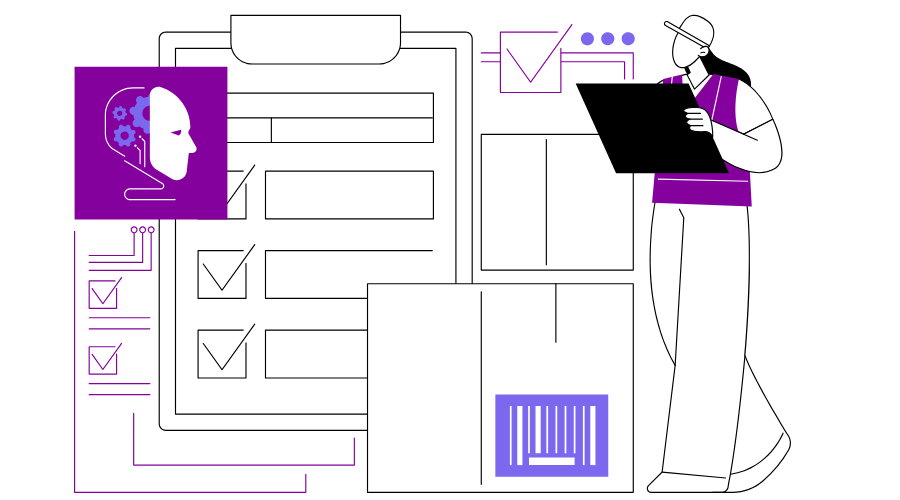
“AI is probably the most important thing humanity has ever worked on. I think of it as something more profound than electricity or fire.”
— Sundar Pichai, CEO of Google
Have you ever wondered how much of your daily work could be handled by AI — not someday, but this year?
The age of experimental AI is over. In early 2025, a sweeping majority of organizations have moved past pilot projects and are actively using AI to drive real business results. Product managers are right at the heart of this shift, shaping more innovative products, faster decisions, and entirely new user experiences.
Executives aren’t just dabbling anymore, either: almost all plan to boost their AI investments in the next few years, pushing teams to deliver tangible, measurable outcomes.
In this article, we’ll dive deep into what AI means for product managers today, the opportunities, the challenges, and how to stay ahead as AI becomes your next essential skill.
The AI Revolution in Product Management
Product management has always centered on understanding user needs, defining value propositions, and coordinating cross-functional teams. Today, AI transforms each of those pillars by embedding predictive insights, automating routine analyses, and enabling dynamic personalization. As AI maturity grows, PMs are charting new territories, designing data pipelines, steering model experiments, and translating algorithmic outputs into product decisions.
- Data as a Foundational Asset: AI products depend on high-quality, well-governed data; PMs must partner closely with data engineers to define schemas, labeling standards, and governance policies.
- Iterative Experimentation: Unlike feature toggles, AI models require repeated A/B tests and performance monitoring; PMs set up feedback loops that balance precision, recall, and user impact.
- Cross-Disciplinary Planning: Roadmaps now include milestones for model training, bias audits, and regulatory reviews, turning ethical guardrails into product requirements.
Why AI Matters for Product Managers
As product leaders embrace AI, they become translators, moving between data scientists’ jargon and stakeholders’ market goals. AI fluency empowers PMs to spot opportunities where automation can streamline workflows, personalize experiences at scale, and anticipate user trends before they emerge. Beyond technical know-how, success hinges on cultivating an AI mindset: setting clear objectives for models, framing success metrics, and embedding human-centric values into every release.
- Strategic Storytelling: AI PMs craft narratives that justify investment in data infrastructure and model tuning, tying algorithmic improvements back to KPIs like engagement or retention.
- Ethical Stewardship: From bias detection to privacy compliance, PMs embed fairness checks into feature specs and coordinate with legal and policy teams to mitigate reputational risk.
- User-Centered Validation: AI features must solve real problems; PMs design usability tests that blend qualitative feedback with quantitative model metrics, ensuring technology amplifies rather than alienates users.
Mastering these domains empowers product managers to shape AI-powered offerings while ensuring the solutions are responsible, people-centric, and deliver lasting business value.
AI Product Management Workflows and Best Tools
AI product management workflows span from gathering and synthesizing feedback to training and monitoring models in production. Below, we have a list of spectacular AI PM platforms, each mapped to key workflow stages and with feature-specific bullet points.
Hop on,
Chisel
Best Suited Workflow- All-in-One AI Product Management Platform
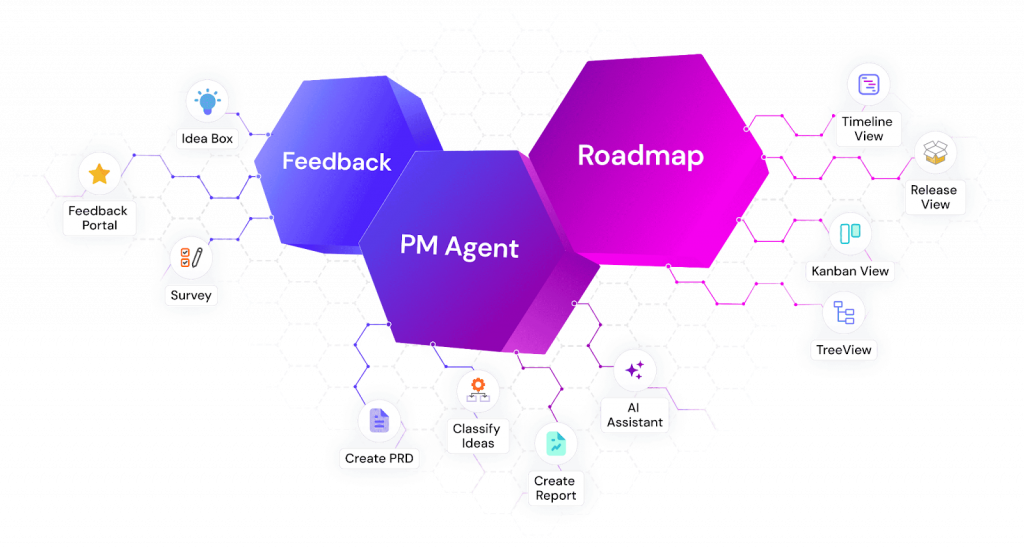
Chisel is the all-in-one AI product management platform that unifies customer feedback, roadmap planning, and team alignment in a single system of record. It is powered by an enterprise-grade, SOC 2-compliant AI PM Agent that automates busywork so PMs can focus on strategic outcomes. With robust two-way integrations, automatic document generation, and a free-forever Starter edition, Chisel ensures every product team moves faster, stays aligned, and delivers customer-driven innovation.
Accelerate PM Productivity
Chisel AI automates critical PM tasks, like customer discovery, PRD/spec creation, and status reporting, by leveraging your own organizational data and custom templates to minimize hallucinations and save hours per week.
Unified System of Record
All your product artifacts live in one place, ensuring feedback drives your roadmap, and every stakeholder is aligned:
- Flexible Roadmaps & Prioritization: Score-based models, feature hierarchies, and multiple views (Tree, Kanban, Timeline) let you tailor roadmaps to your process
- Idea Box & Customer Portals: Ingest feature requests from Gong calls, Zendesk/Intercom tickets, app-store reviews, spreadsheets, and surveys into a central repository
- Team Radar: Include every voice in prioritization—track how priorities align or diverge across your organization to make data-driven decisions, not just the loudest ones.
AI PM Agent Capabilities
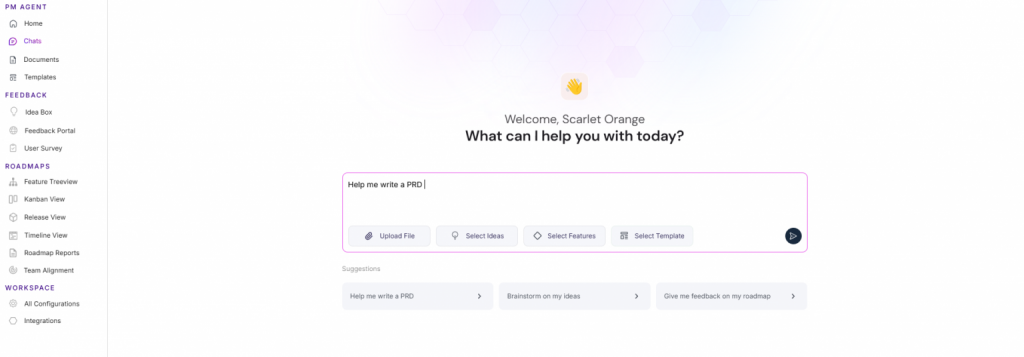
Chisel’s AI PM Agent acts like a Chief Product Officer, using data stored in your Chisel workspace plus custom templates to:
- Classify & Summarize Feedback: Automatically tag thousands of ideas with relevant categories and create concise summaries for each idea card.
- Generate Feature Descriptions: Turn AI-summarized ideas into full feature specs or user stories ready for review and refinement.
- Draft PRDs & Release Notes: Create detailed PRDs, user stories, and release notes in seconds via conversational prompts, using organizational context to ensure accurate outputs.
- Status Reports & Focus Panel: Instantly produce status reports for key releases, get alerts, and recommend actions for important events with the AI Focus Panel.
- Bulk Feedback Classification: Identify emerging sentiment shifts and frequency trends across all feedback without manual effort.
Integrations & Security
Chisel seamlessly connects to your existing toolchain and keeps data safe out of the box:
- Two-way sync is available for Jira, Azure DevOps, Salesforce, Zendesk, Intercom, Slack, Microsoft Teams, and more.
- Enterprise-Grade Security: SOC 2 Type 2 compliance, AES-256 at rest, TLS 1.2+ in transit; your feedback and roadmaps stay private and secure.
Flexible Adoption & Pricing
Choose the plan that fits your team’s needs:
- Starter (Free Forever): Individual PMs get unlimited AI-powered docs, roadmaps, Idea Box (100 ideas), and basic integrations.
- Premium ($49/user mo billed annually): Unlimited features & sub-features, full integrations (Jira, Azure DevOps, Intercom, Zendesk, Slack), Team Radar, branded feedback portals, and premium support.
- Enterprise: Custom onboarding, training, advanced security controls, dedicated AI modules, and SLAs for large organizations
BuildBetter.ai
Best Suited Workflow- Feedback Analysis & Prioritization
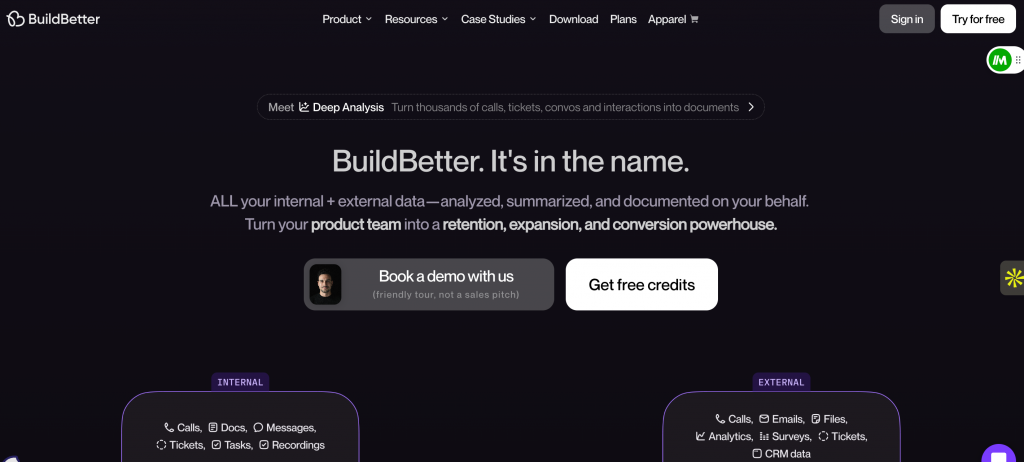
BuildBetter.ai is an AI-powered “Product Assistant” that automatically ingests and structures unstructured customer interactions, from calls to tickets, into actionable insights and workflows. It combines NLP-driven theme and sentiment analysis with private, context-embedded chat to surface and act on feedback in seconds.
Features
- Unstructured Feedback Analysis: Custom models turn calls, tickets, chats, and surveys into structured “Signals” (themes, sentiment, frequency).
- Integrations: Connects with Zoom, Slack, Intercom, ChatGPT, Salesforce, Zendesk, and more.
- Automated Insights & Documents: Instantly generate call summaries, PRDs, personas, and status updates with citations.
- Natural-Language Chat: Data-backed answers to questions like “What are top onboarding requests?” directly within the chat.
ChatPRD
Best Suited Workflow- Spec & Document Creation
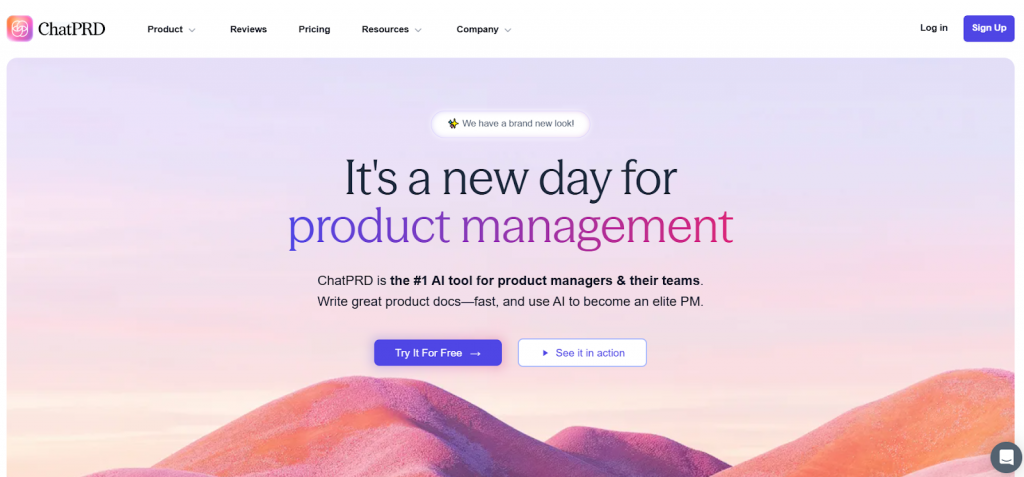
ChatPRD is an AI-powered “Chief Product Officer” copilot that transforms brief feature outlines into full PRDs, user stories, and release notes and lets teams refine them via an in-platform editor. It includes a template library and collaborative workspace for seamless spec creation and iteration.
Features
- AI PRD Generator: From minimal prompts to complete PRDs with objectives, metrics, and mock flows.
- Built-In Editor & Exports: In-platform rewriting, translation, grammar fixes, plus export to Google Drive, Notion, and Slack integration.
- Custom Profiles & Templates: Save company, role, and product context; upload or use 10+ pre-built templates.
- Real-Time Collaboration: Shared editing, version control, and team chat on Team plan.
Notion AI
Best Suited Workflow Knowledge Management & Stakeholder Communication
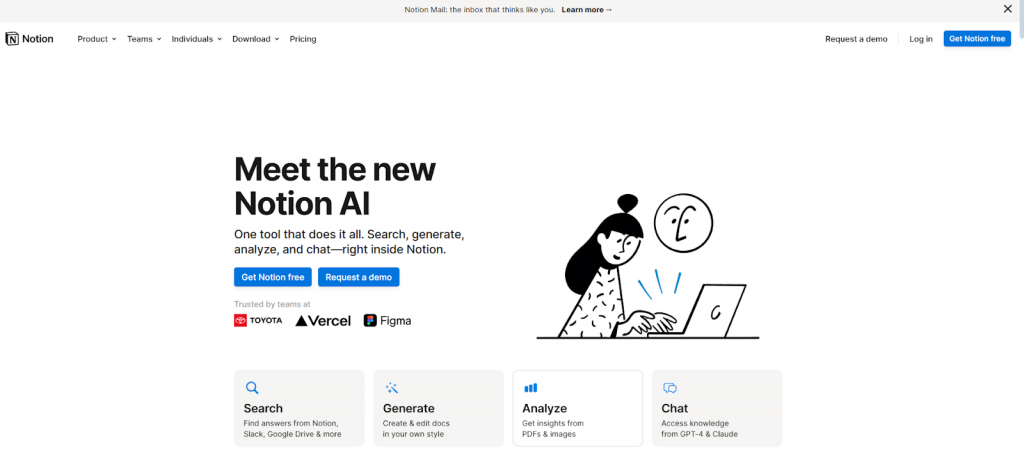
Notion AI embeds generative intelligence across your Notion workspace, auto-summarizing content, generating drafts, and extracting action items without leaving your pages or databases. It analyzes PDFs, images, and inline text to surface insights and plans.
Features
- Smart Summaries: Condenses long pages, meeting notes, or docs into clear bullet-light paragraphs.
- Draft Generation & Brainstorming: Inline /AI blocks of writing blog posts, emails, outlines, and creative prompts.
- PDF & Image Analysis: Summarize and extract key insights from uploaded PDFs and images.
- AI Connectors (BETA): Query-connected apps, Google Docs, Sheets, Slides, and soon GitHub, Jira, etc.
- Useful Integrations: Zoom, Jira, Webex, Typeform, and more.
Microsoft 365 Copilot
Best Suited Workflow- Collaboration & Content Generation

Microsoft 365 Copilot integrates GPT-4o across Word, Excel, PowerPoint, Outlook, and Teams, offering chat-first prompts, AI-driven search, and an agent framework for autonomous assistants.
Features
- GPT-4o Chat Interface: Secure, adaptive chat with memory and personalization across M365 apps.
- AI-Powered Cross-App Search: Queries spanning Slack, Google Drive, Jira, OneDrive, Outlook, and Teams.
- Copilot Prompt Gallery: Discover, save, and share best-practice prompts organization-wide.
- Multimodal “Create” Tools: Generate images, slide decks, and documents directly from chat via GPT-4o.
- Notebooks & Pages: Project-based notebooks and collaborative pages to contextualize data and workflows.
- Integrated Agents: Build and manage autonomous AI agents (e.g., for market research, drafting, meeting prep) in the Agent Store.
7 Skills Required For Becoming an AI Product Manager
When AI shifts from “nice-to-have” to the engine driving your product’s success, you need more than curiosity; you need a precision toolkit. In 2025, many executives plan to ramp up AI budgets over the next three years, and 56 percent of product professionals cite AI/ML as their top focus. To turn that investment into real-world impact, you must master seven core competencies:
1. AI & Machine Learning Foundations
Why it matters: You’ll set realistic expectations and partner seamlessly with data teams.
- Distinguish supervised vs. unsupervised models, neural networks vs. decision trees.
- Translate precision, recall, and F1 scores into business metrics (e.g., reduced churn)
2. Data Literacy & Pipeline Oversight
Why it matters: Garbage in, garbage out, your decisions hinge on trustworthy data.
- Design and validate data schemas, labeling guidelines, and governance policies
- Apply descriptive and inferential statistics to uncover actionable trends.
3. Strategic Vision & ROI-Driven Roadmapping
Why it matters: AI features must justify their growth, retention, or revenue cost.
- Identify high-impact AI use cases with clear business cases and financial models
- Balance short-term wins against long-term AI infrastructure investments
4. Technical Storytelling & Cross-Functional Alignment
Why it matters: Your ability to “translate AI talk” makes or breaks stakeholder buy-in.
- Craft concise narratives around model capabilities, limitations, and trade-offs
- Write crystal-clear PRDs that weave in success metrics, risks, and compliance checks.
5. Ethical Stewardship & Responsible AI
Why it matters: Trust is non-negotiable; bias or privacy missteps can derail your product.
- Implement bias-detection audits and continuous fairness monitoring.
- Embed GDPR, CCPA, and industry-specific privacy requirements into specs.
6. Experimentation & Analytical Rigor
Why it matters: Data-driven tests separate guesswork from game-changing insights.
- Frame hypotheses with clear control groups, sample sizes, and success criteria
- Interpret statistical significance and confidence intervals to guide pivots.
7. Adaptive Leadership & Continuous Learning
Why it matters: In the fast-moving world of AI, agility and empathy keep teams motivated.
- Lead iterative workshops and demos to maintain momentum and morale.
- Cultivate a feedback culture that turns model learning into product improvements.
Mastering these skills will position you not just as a product manager who uses AI but as an AI product leader who drives it, ensuring your innovations deliver real value and earn lasting customer trust.
AI Courses for Product Managers
Below are some of the top AI-focused learning opportunities grouped into Free and Paid sections, designed to help PMs build the right toolkit for leading AI-driven products.
Free Courses
- AI For Everyone (Coursera, Andrew Ng)– Gain a business-friendly overview of AI, its terminology, ethical considerations, and how to frame AI projects in your organization. 4 modules, beginner level, free to audit.
- Machine Learning Crash Course (Google AI)- A hands-on, 15-hour introduction featuring interactive visualizations, video explainers, and coding exercises to ground you in core ML concepts
- Elements of AI (University of Helsinki & Reaktor) is a two-part MOOC in multiple languages that covers AI basics, neural networks, and real-world problem-solving. No programming is required.
- Artificial Intelligence: Implications for Business Strategy (MIT Sloan on edX)– Executive-level course on how AI, NLP, and robotics reshape business strategy and operations, free to audit, certificate optional
- AI for Everyone: Master the Basics (IBM on edX)– Introductory non-technical courses from IBM covering AI fundamentals, chatbots, and business use cases, free to audit
Paid Courses
- AI Product Manager Nanodegree (Udacity)– $399/mo, a 4-month program with real-world projects (PRDs, roadmaps, LLM integration). Hands-on labs in personalization, forecasting, and bias analysis.
- AI Product Management Specialization (Duke University on Coursera)– 3-course series (~$49/mo with Coursera subscription), 4 months at 5 hrs/week. No coding is required, and it focuses on ML lifecycle, human-centered design, and ethics.
- IBM AI Product Manager Professional Certificate (Coursera)– 10-course career certificate, learn product management, prompt engineering, and generative AI in 3 months (subscription-based)
- Artificial Intelligence for Product Certification (AIPC) (Product School) Live, instructor-led cohort: Single Certification $2,999 or Unlimited Membership $4,999/yr. Deep dive into AI-native UX, prompt design, and go-to-market strategies.
- Generative AI for Product Managers LinkedIn Learning– Self-paced modules on LLMs, prompt engineering, and integrating generative AI into your product roadmap, accessible via LinkedIn Premium (~$29.99/mo).
Conclusion
Whether you’re just dipping your toes into AI or ready to dive headfirst, there’s a course to match your pace and budget. From AI For Everyone to hands-on nano degrees and live certifications, these programs will stock your PM toolbelt with the strategies, frameworks, and hands-on chops you need. The right mix of theory and practice will have you hitting the ground running, steering AI products that truly move the needle, and letting you look back and say, “I nailed it.”
